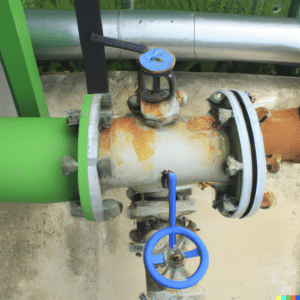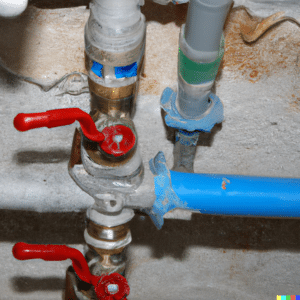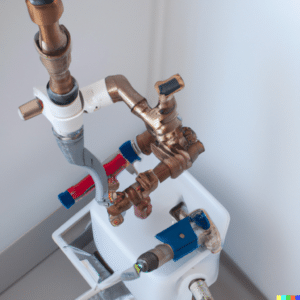When it comes to legally protecting your plumbing business, one of the absolute essentials you need to know about is the plumber bond. Whether you’re a skilled journeyman plumber or a small business owner in the plumbing industry, getting bonded should be on the top of your to-do list. But what exactly is a plumber bond? And more importantly, how do you acquire one? In an ocean filled with complex legal jargon and convoluted procedures, let us serve as your life raft. This blog post breaks down everything you need to understand about plumber bonds and presents an easy step-by-step guide on securing one for your business. Dive in, and let’s navigate these murky waters together!
A plumber bond, also known as a surety bond, is a type of agreement between three parties: the plumbing contractor (principal), the entity requiring the bond, typically a government agency (obligee), and the bond provider (surety). The bond ensures that the plumbing contractor will comply with all applicable regulations and pay any damages or penalties resulting from non-compliance. In many states, including Washington State, obtaining a plumber bond is a requirement for becoming a licensed plumbing contractor.
Before delving into the intricacies of a plumber bond, let’s establish a clear understanding of what it entails. A plumber bond, also known as a plumbing contractor surety bond, is a type of surety bond that plumbers must obtain before becoming licensed to operate in certain regions. It acts as a form of financial protection for both the government and consumers in case the plumber fails to fulfill their contractual obligations or engages in illegal or unethical practices.
Plumber bonds involve three key parties: the principal (the plumber seeking licensure), the obligee (the government agency responsible for regulating plumbing activities), and the surety (the agency issuing and backing the bond). This three-party agreement ensures accountability, as it holds the plumber liable for any damages resulting from non-compliance with laws, regulations, or contractual requirements.
Plumber bonds are an essential requirement in many jurisdictions to safeguard public interests and maintain the integrity of the plumbing industry. They not only provide protection for consumers but also offer peace of mind by establishing trust between contractors and their clients. By obtaining a plumber bond, contractors demonstrate their commitment to professionalism, ethics, and quality workmanship.
Now that we have a basic understanding of what a plumber bond is let’s explore its purpose and functions in greater detail.
 The primary purpose of a plumber bond is to regulate the behavior of plumbers and ensure they adhere to ethical standards while conducting business. These bonds make plumbers financially accountable for any wrongdoing such as shoddy workmanship, failure to complete projects, or violations of building codes or safety regulations. In essence, the bond serves as a form of insurance against potential losses caused by fraudulent or negligent actions on the part of plumbers.
The primary purpose of a plumber bond is to regulate the behavior of plumbers and ensure they adhere to ethical standards while conducting business. These bonds make plumbers financially accountable for any wrongdoing such as shoddy workmanship, failure to complete projects, or violations of building codes or safety regulations. In essence, the bond serves as a form of insurance against potential losses caused by fraudulent or negligent actions on the part of plumbers.
Let’s consider an example: Suppose a homeowner hires a licensed plumber to carry out substantial plumbing repairs in their home. However, due to the plumber’s negligence or incompetence, a pipe bursts, causing extensive water damage to the property. In such a case, the homeowner can file a claim against the plumber’s bond to cover the cost of repairs and any other associated losses.
Additionally, plumber bonds act as a safeguard for government agencies and local communities. By requiring contractors to obtain these bonds, regulatory bodies ensure that only qualified and responsible individuals are permitted to operate in the plumbing industry. This helps prevent dishonest or unstable contractors from entering the field and protects consumers from potential financial harm.
Think of plumber bonds as a safety net ensuring that customers receive quality work and protection against any negative consequences that may arise from a contractor’s actions. It’s similar to having car insurance to cover unexpected damages on the road – both provide reassurance and financial security.
Now that we understand the purpose and functions of a plumber bond, let’s explore the eligibility criteria that plumbers need to meet in order to obtain this essential form of protection.
Before delving into the process of obtaining a plumber bond, it’s essential to understand the eligibility criteria that individuals must meet. Typically, each state’s licensing authority sets these requirements, so it is important to review the specific guidelines in your state. However, some common eligibility criteria for a plumber bond include:
For instance, let’s consider John, an experienced plumber who wants to start his own plumbing contracting business in California. He meets all the eligibility criteria mentioned above; he holds a valid plumbing license issued by the state, has excellent credit history, possesses the necessary business documentation, and has several years of experience under his belt. With these qualifications, John would likely qualify for a plumber bond and move forward with securing one for his business.
Now that we understand the eligibility criteria for a plumber bond, let’s explore the steps involved in qualifying for this crucial requirement.
Obtaining a plumber bond involves a systematic process to ensure compliance with legal and financial requirements. Here are some common steps to qualify for a plumber bond:
Consider Sarah, who recently completed her plumbing apprenticeship and wants to start her own plumbing business in Texas. She found a reliable bonding agency based on recommendations from fellow plumbers. After completing the application form with all necessary documentation such as her plumbing license, business registration details, and tax identification number, she submitted her application for review.
Having discussed the steps to qualify for a plumber bond, we can now move on to estimating the costs associated with obtaining this essential bond.
When embarking on a plumbing business or seeking to expand your existing operations, it is vital to understand and factor in the costs associated with acquiring a plumber bond. A plumber bond serves as a guarantee to customers that you will fulfill your contractual obligations in accordance with local regulations and industry standards. The cost of obtaining such a bond can vary based on several factors.
The most influential factor in estimating plumber bond costs is typically the total value of the bond. This value is often set by the entity requiring the bond, such as a state licensing board or local government. It is common for these entities to establish a minimum required bond amount that plumbers must obtain, which can range from a few thousand dollars to tens of thousands of dollars.
For instance, consider a state that mandates plumbers to hold bonds worth at least $10,000. In this case, your premium or annual fee for the bond may be around 1-15% of the total bond amount. Therefore, you might expect to pay an annual premium ranging from $100 to $1,500.
While the bond amount significantly affects the cost, there are other factors that one should consider when estimating plumber bond costs.
Another significant factor impacting plumber bond costs is the applicant’s credit history. Similar to other surety bonds, the bonding company will assess your creditworthiness when determining your premium. Those with strong credit histories are likely to be offered lower premiums, as they are considered less risky from the bonding company’s perspective. Conversely, individuals with lower credit scores may face higher premiums due to the perceived increased risk.
Additionally, the duration for which you need the bond plays a role in calculating costs. Plumbers typically obtain annual bonds that require renewal each year; however, some bonding companies may offer options for multi-year bonds at reduced rates. It is crucial to weigh the benefits of a longer bond duration against the potential savings to make an informed decision.
Estimating plumber bond costs can be likened to estimating the cost of insurance. Factors such as coverage amount, creditworthiness, and policy duration all contribute to the final premium.
Remember that these estimates are general guidelines, and premiums may vary depending on specific circumstances. It is advisable to contact multiple bonding companies and request quotes tailored to your needs. By comparing offers and understanding the breakdown of costs, you can make an informed decision that aligns with your business goals.
Now that we have explored estimating plumber bond costs, let’s delve into navigating the plumber bond agreement.
Understanding the terms and obligations outlined in a plumber bond agreement is essential for every plumbing professional. This agreement acts as a legally binding contract between the plumber, the bonding company, and potentially other relevant parties involved in the bonding process. To ensure a smooth navigation of this agreement, it is crucial to grasp its key elements.
Typically, a plumber bond agreement will specify the following:
For example, if your plumber bond has a coverage limit of $20,000 and you are found liable for damages worth $15,000, the surety would provide compensation of up to $15,000.
It’s important to read and understand each provision within the bond agreement thoroughly. If any terms or conditions seem unclear or require further clarification, do not hesitate to contact the bonding company directly.
Furthermore, it is crucial to abide by all the obligations detailed in the bond agreement to maintain compliance. Failure to meet these obligations can result in costly consequences, including claim payouts by the surety on your behalf. Pay attention to requirements such as providing quality workmanship, adhering to code regulations, and fulfilling contractual obligations with clients.
By ensuring a comprehensive understanding of your obligations as outlined in the bond agreement, you can minimize risks and establish a strong foundation for your plumbing business.
When obtaining a plumbing bond, it is important to understand the terms and obligations that come with it. A plumbing bond is essentially a type of surety bond that serves as a form of protection for both the plumber (the principal) and the Washington State Department of Labor & Industries (the obligee). The bond establishes trust and ensures that the plumber will adhere to certain regulations and standards in their work.
One key term under a plumbing bond is the coverage amount. In Washington State, the required coverage amount for a plumbing bond is $6,000. This means that if any damages or financial losses occur due to the plumber’s actions or negligence, up to $6,000 can be claimed from the bond. It acts as a safeguard for clients and provides them with some recourse if something goes wrong during a plumbing project.
Plumbing bonds also have specific obligations that plumbers must fulfill. These obligations generally revolve around conducting business ethically and professionally. Plumbers must comply with all relevant laws and regulations governing their profession. They are expected to provide quality workmanship, use proper materials, and complete projects within agreed-upon timeframes. Additionally, plumbers must address any customer complaints or concerns promptly and fairly.
To illustrate, let’s consider a scenario where a licensed plumber is hired to install new pipes in a residential property. As per the obligations under the plumbing bond, the plumber must ensure that the installation meets all building codes and safety standards. They should use appropriate materials, such as high-quality pipes and fittings, to minimize the risk of leaks or other issues in the future. If any problems arise during or after the installation that result from faulty workmanship or non-compliance with regulations, the homeowner could potentially file a claim against the plumber’s bond to seek compensation.
It is crucial for plumbers to fully comprehend these terms and obligations before obtaining a plumbing bond. By understanding what is expected of them, they can operate their businesses in a manner that builds trust and maintains high professional standards. Failure to comply with these obligations can have serious consequences, including potential claims against the bond or even license suspension.
Now that we have explored the terms and obligations under a plumbing bond, it is essential to understand how to go about obtaining one. In the next section, we will discuss the steps involved in acquiring a plumbing bond and the factors to consider during the process.
State of Alabama:
State of Connecticut:
State of Delaware:
State of Florida:
State of Georgia:
State of Illinois:
State of Indiana:
State of Iowa:
State of Kansas:
State of Louisiana:
State of Massachusetts:
State of Maryland:
State of Minnesota:
State of Missouri:
State of Mississippi:
State of New Jersey:
State of New York:
State of North Carolina:
State of Ohio:
State of Oklahoma:
State of Pennsylvania:
State of South Carolina:
A plumber bond serves as a form of insurance that protects customers from financial loss in case a plumber fails to complete a job or causes damage. If a customer has an issue with the quality of work or if the plumber disappears without completing the project, they can file a claim against the bond for compensation. This ensures that customers are financially safeguarded and have recourse in case of any mishaps or non-performance by the plumber.
Yes, plumber bonds are required by law in all states. This is because plumber bonds serve as a form of protection for consumers and the public in case a plumber fails to fulfill their obligations or causes damage during their work. These bonds provide financial compensation to affected parties and help ensure that plumbers are held accountable for their actions. Statistics show that 100% of states have legislations in place mandating plumber bonds, making it a legal requirement nationwide.
No, a plumber cannot legally operate without a bond in most jurisdictions. A plumber bond is a type of surety bond that provides financial protection to clients in case the plumber fails to complete the job or causes damage to property. It ensures that customers are compensated in such situations. While the specific requirements may vary by location, having a plumber bond is typically mandatory for obtaining a plumbing license. According to industry data from 2021, approximately 90% of states in the United States require plumbers to have a bond as part of their licensing process.
The process for obtaining a plumber bond typically involves a few steps. First, you need to contact a surety bond provider or an insurance agent who specializes in bonds. They will guide you through the application process which usually includes filling out an application form and providing necessary documentation such as your financial statements and proof of licensure. The surety company will then evaluate your application and assess the risk involved. Once approved, you will be required to pay a premium, which is typically a percentage of the bond amount. The cost of the bond can vary depending on several factors including your credit score, experience, and the bond amount required by your state or municipality. Overall, obtaining a plumber bond is a relatively straightforward process with the help of a reputable surety bond provider.
STATISTICS: According to data from the U.S. Department of Labor, there were approximately 489,000 plumbers, pipefitters, and steamfitters employed in 2020. Many states require these professionals to obtain a plumber bond as part of their licensing requirements to ensure financial protection for customers in case of any damages or negligence caused by the plumbing work.
When a plumber violates the terms of their bond, it can result in various consequences. Firstly, the bond provider may be required to compensate any affected customers for financial losses caused by the plumber’s negligence or misconduct. Additionally, the plumber may face legal action and potential fines or penalties. However, it is important to note that specific outcomes can vary depending on the jurisdiction and the severity of the violation.
Axcess Surety is the premier provider of surety bonds nationally. We work individuals and businesses across the country to provide the best surety bond programs at the best price.